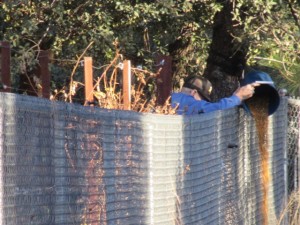Our neighbor Roy, 93 and a World War II veteran, feeds the elk regularly. One of them even allows him to stroke her muzzle. What a great hobby for someone who sacrificed so much building airstrips on Pacific Islands seventy-some years ago.
 Yesterday I heard him croon to an elk, “You back again? Getting a little selfish, aren’t you? You know I like to feed the deer, too.”
Yesterday I heard him croon to an elk, “You back again? Getting a little selfish, aren’t you? You know I like to feed the deer, too.”
Roy writes his story one day at a time and the elk act it out. He just supplies the grain, or shall we say, fodder?
There’s so much novel fodder here under the Mogollon Rim. One of my novels (hopefully publishable at some point), tells the story of a young woman desperate to belong. After losing her family in freak accidents, she’ll pay any price, and does. Every day, she watches the sun climb DOWN the Rim, since it first has to peak over the other side to reach this valley.
Ah, how life twists things around! Dottie, the World War II heroine I’ve mentioned before, experiences the topsy-turvy effects of a horrendous war.
But both of these characters, and all of us, find courage and tenacity during these tough times. The question is, will our characters make changes necessary to their well-being?
Soren Kierkegaard wrote, “All change is preceded by crisis.” And for fiction writers, crisis is integral to the plot. And as Tracy Groot shared with us the past two weeks, so is the setting: feeding Arizona elk or working at a 1947 small-town Iowa boarding house demand different mindsets. In both Dottie and Abby’s lives (and our own), character and setting meld with plot as crises arise.
I’d like to hear your favorite fiction crisis . . . Scarlet O’Hara’s dilemma, the harried chase in True Grit, or some other difficult situation? Or share how you blend setting and scenario in your own writing.
Sara Goff won the giveaway of Tracy Groot’s The Sentinels of Andersonville–congratulations! Thanks for stopping by, and have a great, creative week!

